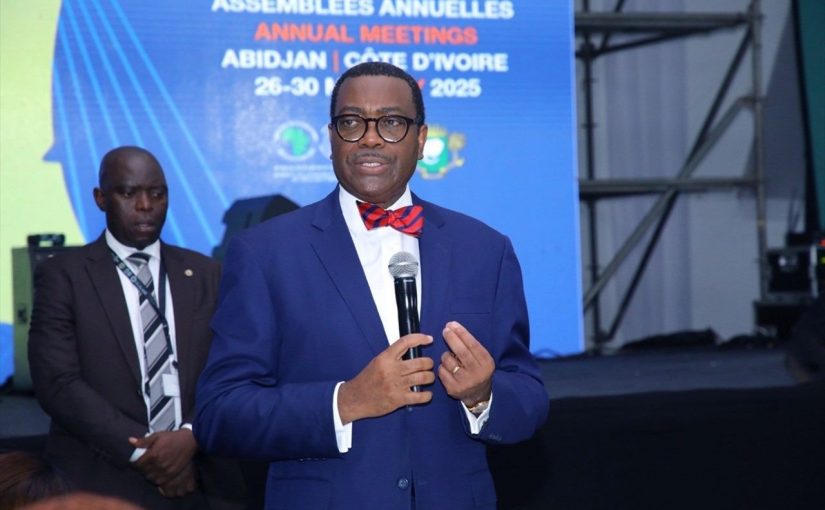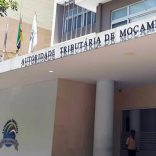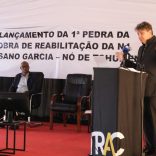Mozambique: Budget of the Presidency reduced by more than 2.7 billion meticais - Carta
CPLP: Outgoing AfDB chief pleased with successes in Portuguese African nations

Photo: SIKA Finance/X
The president of the African Development Bank (AfDB) on Monday praised the work in Portuguese-speaking countries and Portugal’s support in facilitating investment, at one of his farewell events.
“I am very pleased with what we have achieved together in these countries and I would like to reiterate my gratitude to Portugal for its support,” said Akinwumi Adesina, in response to Lusa during a meeting with journalists ahead of the institution’s annual meetings in Abidjan, Ivory Coast.
The official opening of the meetings is scheduled for Tuesday and will run until the end of the week. One of the items on the agenda is the election of a new president.
During Adesina’s two terms (10 years), the Lusophone Compact was created, a financial instrument that brings together Portugal, Brazil and the six Portuguese Language African countries – PALOPs (Angola, Cabo Verde, Guinea-Bissau, Equatorial Guinea, Mozambique and São Tomé and Príncipe) in co-financing, risk mitigation and technical assistance for private investment.
Portugal has provided a guarantee of around €400 million for the compact and has already given pre-approval to cover a project that will benefit from €100 million in financing, which is awaiting signature.
The guarantee expired at the end of 2023 and the AfDB is also awaiting the signing of a renewal, which will accompany a new 10-year memorandum of understanding, already pre-agreed with the Portuguese government (before the May elections), according to information from the bank.
“These are guarantees that remove risks for investments in that group of countries, it is the first of its kind” and is working very well, said Adesina.
According to the latest data, in addition to the amount covered by the guarantees, the compact has already financed a total of €214 million in different projects in Portuguese-speaking countries.
The instrument was an innovation, but the AfDB’s presence in Portuguese-speaking countries is mainly due to its vocation for public development support, with concessional financing for each state.
“I saw fantastic things, such as what is underway in Cabo Verde with the technology park,” financed by the bank and recently inaugurated by Adesina himself in the city of Praia.
Support for agriculture in Guinea-Bissau and support for the energy and communications sector in Angola, with the Lobito Corridor, were other points mentioned today by the AfDB president when recalling the PALOP countries, from which he now bids farewell with a “thank you”.
“Leadership may change, but our mission remains the same. The bank’s compass is steady, its veins are strong and its commitment to Africa’s development is unshakeable,” said Adesina in a speech to journalists in which he said that the grey hairs he had gained in 10 years were, after all, a sign of satisfaction at having contributed to such diverse goals as extending food security and drinking water distribution, but also placing the AfDB among the institutions that most promote financial innovation.
“I leave confident in the financial strength [of the AfDB], capable of weathering storms” and, despite leaving office at a time of great uncertainty, Adesina rejects a posture of permanent complaint, pointing to the institution as a multilateral partner capable of “helping to navigate a complex world”.
Population growth outpacing economic growth is often one of the frequent complaints about Africa.
“And why is the [growing] population not a problem for India or China? It is only a problem when it is not educated,” he said, pointing to the title of this year’s meetings.
‘Making the most of Africa’s capital to promote its development’ will be the central theme of the debate, in addition to cross-cutting issues such as digital transformation, institutional strengthening and good governance.
The bank aims to identify “opportunities” and implement “specific policies to make Africa’s capital – human, natural, financial and commercial – the main driver of structural transformation and the transition to more inclusive, greener and more resilient economies in the coming decades”.
The expectation is that this formula will serve to “leverage external capital flows from various partnerships to complement Africa’s development financing needs”.
The African Development Bank Group is the continent’s leading development finance institution and has 81 member states, including 53 African countries and 28 countries outside the continent, including Portugal and Brazil.
As #AfDBAM2025 kicks off, we’re spotlighting the @AfDB_Group’s Ten-Year Strategy 2024–2033 — our roadmap for inclusive growth, resilience, and #ClimateAction.
Access the #AfDB10YS here: https://t.co/vKQRDrAB6B pic.twitter.com/VFyFyZRevU
— African Development Bank Group (@AfDB_Group) May 26, 2025
Akinwumi Adesina : ‘’Je laisse une institution solide, unie, et résolument tournée vers l’avenir’’ @AfDB_Group https://t.co/rOixlrbkd9 pic.twitter.com/9qReLHQ82Q
— SIKA Finance (@finance_sika) May 26, 2025












Leave a Reply
Be the First to Comment!
You must be logged in to post a comment.
You must be logged in to post a comment.